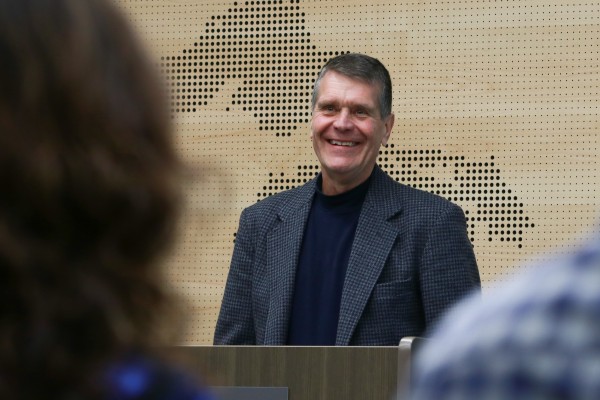 Electric and computer engineering assistant professor Dr. Shahpour Alirezaee in the mechatronics lab at the University of Windsor.
Electric and computer engineering assistant professor Dr. Shahpour Alirezaee in the mechatronics lab at the University of Windsor.
By Lindsay Charlton
In a two-acre greenhouse dedicated to research and development at JEM Farms in Kingsville, Ont., Shahpour Alirezaee is working on advanced technology to help growers improve plant pollination.
Dr. Alirezaee, a University of Windsor engineering professor specializing in mechatronics and robotics, is developing an autonomous robotic pollination system.
“Robotic pollination is a replacement for traditional systems, which typically rely on bees or humans. We aim to replace these methods with advanced robotic platforms that use vision systems and artificial intelligence to achieve the same results,” Alirezaee explained.
Using an AI vision system and a 3D camera to detect the plant’s flowers — making this technology unique — the robot is mounted on a platform and equipped with arms and specialized tools.
“Once we locate the flowers, the robot’s signal triggers a second robot to reach the location, where a vibration mechanism is used to pollinate the flowers,” he said.
This technology can help address the challenges commercial greenhouses face with traditional pollination methods, such as timing and consistency.
“Automatic pollination works best in the winter months when bees aren’t as effective,” said Jamie Mastronardi, general manager of JEM Farms. “Bees rely on natural sunlight, so automating pollination makes it much easier during the darker months of December, January, and February.”
As a major producer of tomatoes, which require pollination, Mastronardi said this technology can make the process easier and more reliable, leading to better yields and ultimately better taste.
While the robot is developed in Alirezaee’s lab on campus, he and other researchers can test their mechanisms in a fully operational innovation greenhouse dedicated to research and proof-of-concept designs.
This state-of-the-art facility is part of a collaboration between the University of Windsor and Horteca, a joint venture between JEM Farms and Ecoation, which specializes in pest management and yield forecasting platforms.
Established in 2022 under the “Agriculture at UWindsor” (AgUWin) banner, the greenhouse provides a unique space for advancing agricultural technology in Essex County, the largest greenhouse-growing area in Canada.
“When people think of agriculture, they think about farming and tractors. The greenhouse sector provides a lot more than that. By collaborating with the University, we see opportunities to innovate further, address our specific needs, and tackle the challenges we face,” said Paul Mastronardi, director of JEM Farms.
Mastronardi, a third-generation greenhouse grower, said technology has significantly improved over the years and is advancing rapidly in the sector.
“For example, using artificial intelligence to help with growing,” he added. “You still need a green thumb in the farming industry, but how do you combine both to make that work and use it to be more efficient and excel on the farming side?”
Finding those solutions is not without its challenges, Alirezaee noted.
“The size and orientation of the objects are different,” he said. “Take cucumbers, for example — they’re not all the same shape or size. In contrast, with robotics used in automotive systems, there’s no such uncertainty. Using advanced machine learning techniques, we should be able to detect the flowers or vegetables without obstacles.”
Alirezaee said he and his team are hoping to expand this technology to other applications inside the greenhouse.
His project is one of many in development as part of the AgUWin collaboration.

Haleh Nazemi, who recently completed her PhD at the University of Windsor, is part of a team working with professor Dr. Arezoo Amadi to build gas sensors for volatile organic compound (VOC) detection.
Haleh Nazemi, who recently completed her PhD at the University of Windsor, was part of a team working under professor Dr. Arezoo Amadi to build gas sensors for volatile organic compound (VOC) detection.
This technology can be used in a greenhouse environment to measure temperature, humidity, carbon dioxide, and other environmental factors in real time.
“We can also use these sensors to detect pests and the VOCs they emit,” Dr. Nazemi said. “We can monitor them in real-time, analyze the data, and assess the presence of pests, their concentration, and severity.”
“Dealing with food, it’s about sustainability and food safety. We want to immediately realize if there’s an issue and act before anything spreads in the greenhouse, which is why real-time measurements are so important. We can wirelessly capture and analyze the data and take care of the issue quickly.”
Much like a fingerprint at a crime scene, each pest leaves a unique trace behind.
“We’ve collected data and tested our sensors in a controlled lab environment to understand how they respond to these specific volatiles. When we move through the greenhouse, our sensors can detect these specific VOCs. Based on the concentration levels, we can assess the severity of the issue and identify the types of pests present, all without the need to visually spot them. This allows us to detect pests at very early stages of their life cycle,” she said.
Accessing a greenhouse is crucial, making this initiative key to this research, which ultimately aims to assist farmers in maximizing their yield.
Back on campus, Dan Xiao, a professor in the Department of Physics, is using portable MRI technology to measure plant physiology — an area inspired by her own passion for gardening.
“We’re always looking for novel applications. We design magnetic resonance imaging methods and instruments, but having a specific target is always beneficial. With access to such a powerful tool, what can we used it to study?” Dr. Xiao explained.
Using the same principles as an MRI machine in a hospital, the technology she develops is for much smaller and more affordable instruments, enabling the study of small animals, plants, and other unconventional systems.
“It’s just another technique that can provide new insights into systems we couldn’t measure before,” Xiao said.

Dan Xiao, a professor in the Department of Physics, working with a student in a University of Windsor lab.
She explained that most current plant measurements are indirect, such as measuring metabolites like CO2 levels on the surface of a plant's leaves or tracking water and nutrient transport by measuring moisture or humidity.
However, by using MRI technology, she and her team can directly measure fluid within the plant, offering a more precise and detailed view.
“The main advantage of this technology is that it allows us to look inside a biological system without disturbing it — just like we can study the human brain without opening a patient's head. Similarly, we don’t need to cut open a plant to directly see what’s inside. It's completely non-invasive,” Xiao said.
While other methods exist, she pointed out that they’re often limited to lab settings. She and her team are now working on a portable prototype based on a permanent magnet that could be used in greenhouses to take measurements while plants are growing.
“We could measure the stems, fruits, and different parts of the plants while they grow, and correlate these measurements with external environmental conditions, such as light intensity and spectrum, temperature, moisture, and nutrients. We could even measure how plants respond to diseases and study their general physiology.”
“I think this shows great potential,” Xiao said. “It’s something that could be mass-produced at a low cost and applied in various fields. Agriculture is just one of them.”
As these and other projects continue to develop, researchers are working to refine technologies to improve the future of greenhouse farming. With advancements across various areas of agricultural technology, the focus remains on creating practical solutions to address the challenges facing the industry.






 Gold LEAD Medallion Scholar Tiffany Huang shares a moment outside Essex Hall with her grandfather, Fore-lien Huang, and father, William Huang — both fellow UWindsor science alumni. The family, who travelled from Taiwan for Tiffany’s convocation, celebrates a proud legacy spanning more than five decades and three generations of scientific achievement. (Photo by UWindsor)
Gold LEAD Medallion Scholar Tiffany Huang shares a moment outside Essex Hall with her grandfather, Fore-lien Huang, and father, William Huang — both fellow UWindsor science alumni. The family, who travelled from Taiwan for Tiffany’s convocation, celebrates a proud legacy spanning more than five decades and three generations of scientific achievement. (Photo by UWindsor)